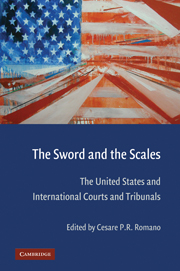Book contents
- Frontmatter
- Contents
- Preface
- Acknowledgments
- Abbreviations
- Contributors
- 1 International Courts and Tribunals and the Rule of Law
- 2 American Public Opinion on International Courts and Tribunals
- 3 Arbitration and Avoidance of War: The Nineteenth-Century American Vision
- 4 The United States and the International Court of Justice: Coping with Antinomies
- 5 The U.S. Supreme Court and the International Court of Justice: What Does “Respectful Consideration” Mean?
- 6 U.S. Attitudes toward International Criminal Courts and Tribunals
- 7 The United States and the Inter-American Court of Human Rights
- 8 From Paradox to Subsidiarity: The United States and Human Rights Treaty Bodies
- 9 The U.S. and International Claims and Compensation Bodies
- 10 Does the United States Support International Tribunals? The Case of the Multilateral Trade System
- 11 The United States and Dispute Settlement under the North American Free Trade Agreement: Ambivalence, Frustration, and Occasional Defiance
- 12 Dispute Settlement under NAFTA Chapter 11: A Response to the Critics in the United States
- 13 The United States and International Courts: Getting the Cost-Benefit Analysis Right
- Index
- References
9 - The U.S. and International Claims and Compensation Bodies
Published online by Cambridge University Press: 05 June 2012
- Frontmatter
- Contents
- Preface
- Acknowledgments
- Abbreviations
- Contributors
- 1 International Courts and Tribunals and the Rule of Law
- 2 American Public Opinion on International Courts and Tribunals
- 3 Arbitration and Avoidance of War: The Nineteenth-Century American Vision
- 4 The United States and the International Court of Justice: Coping with Antinomies
- 5 The U.S. Supreme Court and the International Court of Justice: What Does “Respectful Consideration” Mean?
- 6 U.S. Attitudes toward International Criminal Courts and Tribunals
- 7 The United States and the Inter-American Court of Human Rights
- 8 From Paradox to Subsidiarity: The United States and Human Rights Treaty Bodies
- 9 The U.S. and International Claims and Compensation Bodies
- 10 Does the United States Support International Tribunals? The Case of the Multilateral Trade System
- 11 The United States and Dispute Settlement under the North American Free Trade Agreement: Ambivalence, Frustration, and Occasional Defiance
- 12 Dispute Settlement under NAFTA Chapter 11: A Response to the Critics in the United States
- 13 The United States and International Courts: Getting the Cost-Benefit Analysis Right
- Index
- References
Summary
From its earliest days, the United States has often pursued its policy goals through vigorous engagement in international institutions created to resolve large numbers of claims on the basis of law. The 1794 Jay Treaty between the fledgling United States and the United Kingdom is perhaps best remembered for creating the boundary commission that resolved the disputed St. Croix River Boundary, but it also created two other commissions to address large numbers of legal claims by British and U.S. citizens. The first, which addressed ship seizure claims, succeeded. The second, dealing with colonial-era American debts, failed, for reasons that students of modern dispute settlement processes will find instructive.
Throughout the latter decades of the nineteenth century and the early decades of the twentieth, the United States was a frequent participant in mixed claims commission with its American neighbors. It also participated in claims commissions with Germany, Austria, and Hungary that addressed extensive claims stemming from World War I. Then, however, such claims commissions fell out of fashion. Their work often took years, and some commissions failed to complete their dockets. With a few limited exceptions, international claims processes handling large numbers of claims did not figure in U.S. legal policy or practice for many years after World War II.
This chapter sketches three cases in which these processes were revived and effectively used between 1980 and 2000.
- Type
- Chapter
- Information
- The Sword and the ScalesThe United States and International Courts and Tribunals, pp. 297 - 321Publisher: Cambridge University PressPrint publication year: 2009



